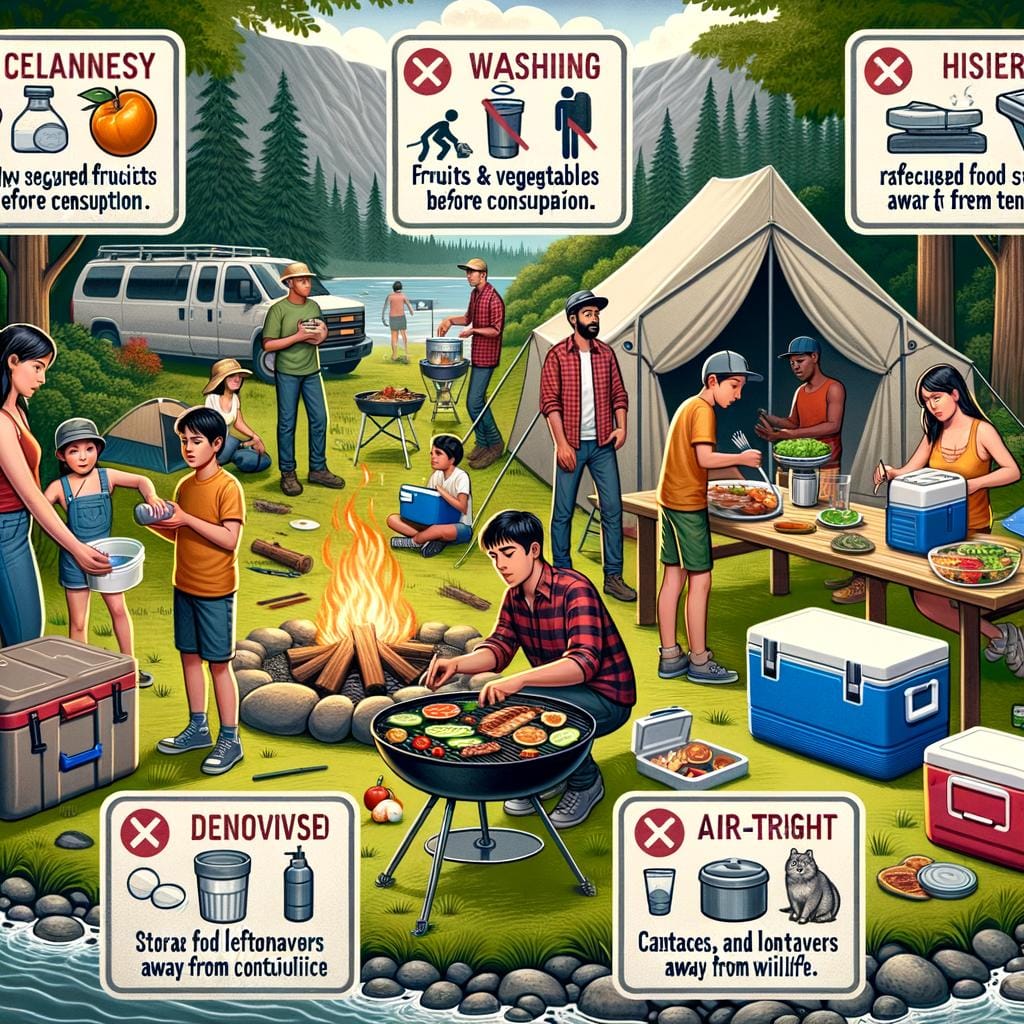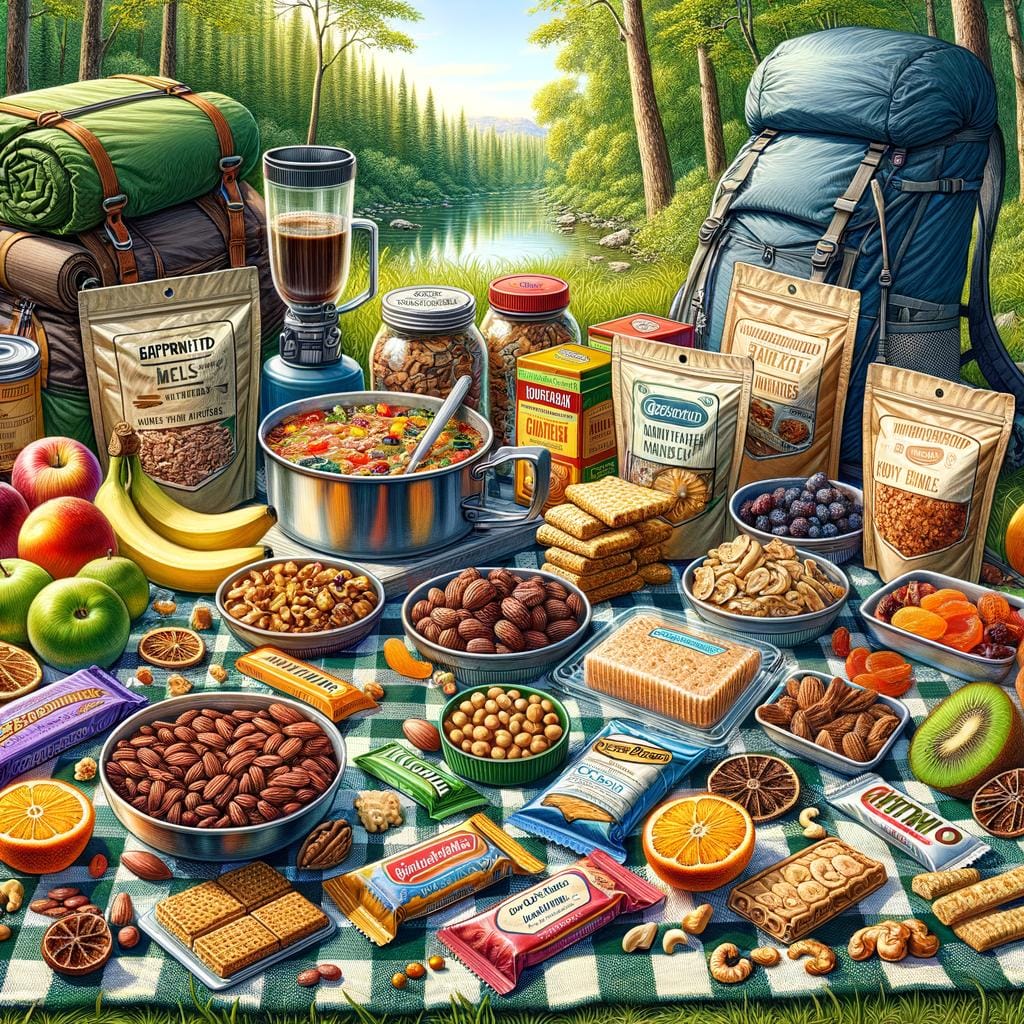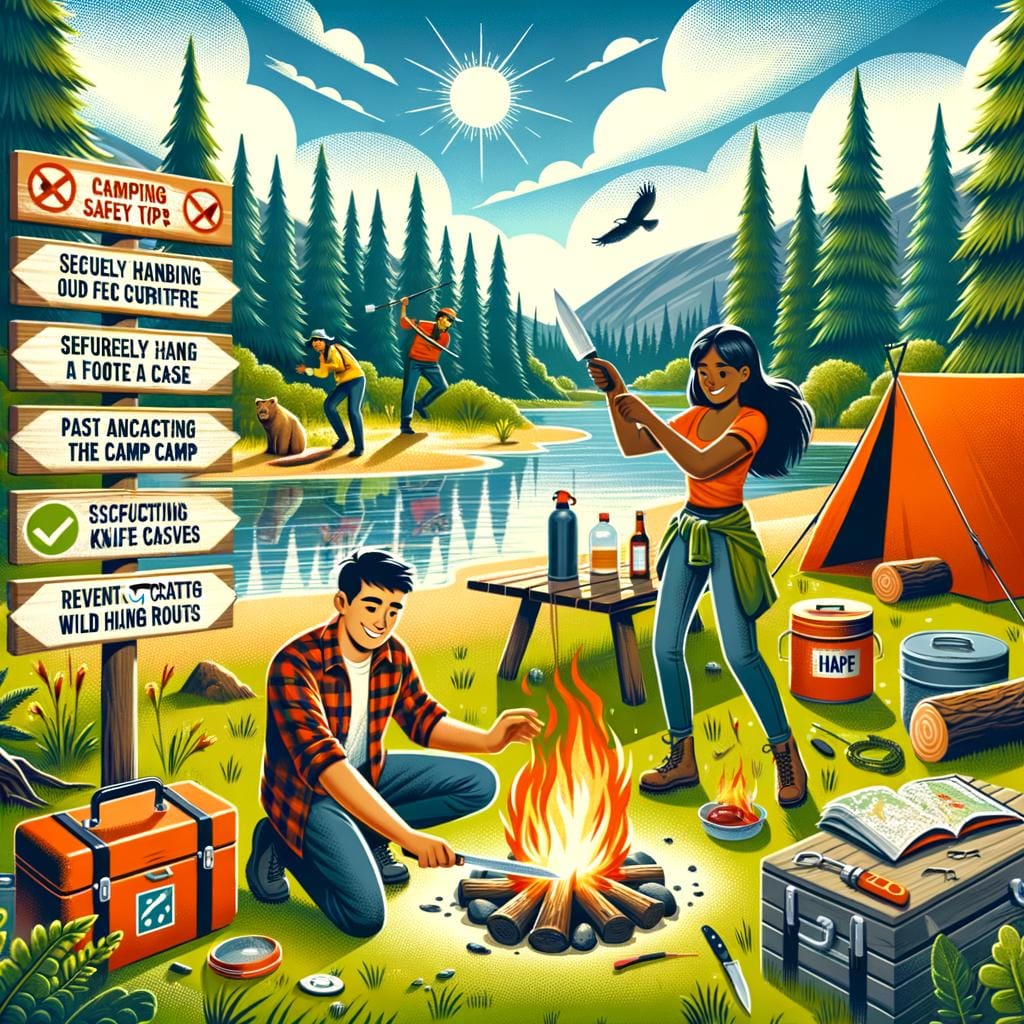When heading out for a camping adventure, one of the key factors to consider is camping food safety. Maintaining proper food handling practices in the outdoors is crucial to ensuring a healthy and enjoyable experience. Whether you are an experienced camper or a novice, understanding the basics of camping food safety can make a significant difference in your trip.
The great outdoors provide a unique setting for enjoying meals, but they also present challenges when it comes to storing, preparing, and handling food. Without the convenience of refrigerators and well-equipped kitchens, campers must be diligent in their approach to food safety. From preventing contamination to avoiding foodborne illnesses, being mindful of best practices is essential for a successful camping trip.
In this article, we will explore the importance of proper food handling in the outdoors, essential tips for packing and storing food for camping, safe cooking practices at the campsite, dealing with food allergies and dietary restrictions while camping, water safety and hydration tips during camping, as well as ways to prevent foodborne illnesses. By following these guidelines, you can enjoy delicious meals while staying safe and healthy in the wilderness.
Importance of Proper Food Handling in the Outdoors
When heading into the great outdoors for a camping trip, one of the most crucial aspects to consider is camping food safety. Proper food handling is essential to ensure that everyone stays healthy and happy during the adventure. The last thing you want is for a foodborne illness to ruin your outdoor experience.
In outdoor settings, the risks of food contamination and spoilage are higher due to factors like higher temperatures, lack of refrigeration, and exposure to wildlife. This makes it even more important to pay attention to how you pack, store, prepare, and cook your food while camping. By following safe food handling practices, you can greatly reduce the chances of encountering any issues related to food safety during your trip.
To maintain good camping food safety practices, always keep raw meat separate from other foods to avoid cross-contamination. Make sure to pack perishable items in a cooler with plenty of ice or ice packs to keep them at a safe temperature.
It’s also important to wash your hands before and after handling food, especially when cooking or eating meals at the campsite. These simple steps can go a long way in preventing any unwanted incidents related to camping food safety.
Essential Tips for Packing and Storing Food for Camping
Camping can be a fun and rewarding experience, but it is important to prioritize camping food safety to ensure a safe and enjoyable trip. Properly handling, packing, and storing food while camping is crucial in preventing foodborne illnesses and ensuring that everyone stays healthy throughout the journey. Here are some essential tips for packing and storing food for camping:
- Plan your meals ahead of time: Before heading out on your camping trip, take the time to plan out your meals. This will not only make packing easier but also help you determine what types of foods you need to bring and how much.
- Choose foods that are easy to store and transport: Opt for non-perishable items such as canned goods, dry mixes, and dehydrated foods that do not require refrigeration. Make sure to pack in airtight containers or resealable bags to prevent contamination.
- Keep perishable items cold: If you plan on bringing perishable items like meats, dairy products, or fresh produce, be sure to pack them in a cooler with plenty of ice packs. Keep the cooler in a shaded area and avoid opening it frequently to maintain the temperature.
Properly organizing your food supplies while camping can make a significant difference in maintaining their freshness and safety. By following these tips, you can minimize the risk of food spoilage or contamination, ensuring that everyone can enjoy delicious meals without compromising their health. Remember, prioritizing camping food safety is key to having a successful outdoor adventure.
Safe Cooking Practices at the Campsite
When it comes to camping food safety, proper cooking practices at the campsite are crucial to preventing foodborne illnesses. One of the first things to ensure is that you cook all foods, especially meats, to their recommended internal temperatures. Invest in a reliable food thermometer to check the doneness of your meals. Avoid cross-contamination by using separate cutting boards and utensils for raw and cooked foods.
Another important practice is maintaining good hand hygiene before handling any food items. While camping, access to running water and soap may be limited, but bringing along hand sanitizer can help you keep your hands clean before preparing or eating meals. Additionally, make sure that all surfaces used for food preparation are cleaned and sanitized regularly to avoid any bacterial contamination.
Proper storage of perishable items is also essential for safe cooking practices at the campsite. Use coolers with enough ice packs or ice to keep foods cold and prevent them from spoiling. Be mindful of how long you store perishable foods in warm temperatures; when in doubt, throw it out. By following these guidelines, you can enjoy delicious meals while minimizing the risk of foodborne illnesses during your camping trip.
| Camping Food Safety Tip | Description |
|---|---|
| Cook foods to recommended internal temperatures | Use a food thermometer and avoid undercooking meats. |
| Maintain good hand hygiene | Use hand sanitizer if running water is not available. |
| Properly store perishable items | Keep foods cold in coolers with ice packs. |
Dealing With Food Allergies and Dietary Restrictions While Camping
Food allergies and dietary restrictions are important factors to consider when planning meals for a camping trip. Failure to accommodate these needs could result in serious health risks for individuals with specific food intolerances or allergies. Here are some essential tips for addressing food allergies and dietary restrictions while camping:
- Communicate with all campers beforehand: Before embarking on your camping trip, make sure to communicate with all campers about any food allergies or dietary restrictions they may have. This will help you plan meals that cater to everyone’s needs.
- Pack separate containers and utensils: To avoid cross-contamination, pack separate containers, cutting boards, utensils, and cooking equipment for preparing meals for individuals with food allergies. This will help prevent accidental exposure to allergens.
- Read labels carefully: When shopping for ingredients or pre-packaged foods, carefully read labels to check for potential allergens or ingredients that may not be suitable for individuals with dietary restrictions. Look out for common allergens like nuts, dairy, gluten, and soy.
Camping food safety extends beyond just proper handling and storage – it also involves ensuring the well-being of all campers by accommodating their unique dietary needs. By taking proactive measures to address food allergies and dietary restrictions, you can create a safe and enjoyable camping experience for everyone involved.
Remember that communication is key when it comes to dealing with food allergies and dietary restrictions while camping. By working together as a group and being mindful of each other’s needs, you can ensure that everyone stays healthy and happy throughout the duration of the trip. Whether it’s preparing separate meals, reading labels diligently, or planning ahead for special dietary requirements, taking these precautions will go a long way in promoting camping food safety for all participants.
Water Safety and Hydration Tips During Camping
When it comes to camping food safety, ensuring proper hydration is just as important as handling food correctly. Dehydration can lead to a number of health issues, especially in the hot and active environment of a camping trip. Here are some water safety and hydration tips to keep in mind during your outdoor adventure:
Bring an Ample Supply of Water
One of the most crucial aspects of staying hydrated while camping is to have enough water on hand. Make sure to pack plenty of clean, potable water for drinking and cooking purposes. It’s better to have more than you think you’ll need, especially if you’re going to be engaging in strenuous activities like hiking or biking.
Stay Hydrated Throughout the Day
In addition to having a sufficient water supply, it’s important to drink consistently throughout the day, even if you don’t feel thirsty. Dehydration can sneak up on you, especially in hot weather or at high altitudes. Keep a water bottle handy and take small sips regularly to maintain proper hydration levels.
Be Mindful of Water Sources
While camping, you may encounter natural water sources like rivers or streams that look tempting for drinking or refilling your bottles. However, these sources may contain harmful bacteria or parasites that can cause illness. It’s best to bring your own treated water or use purification methods such as boiling, filtering, or using water purification tablets before consuming any natural water sources.
By following these water safety and hydration tips during your camping trip, you can ensure that you stay healthy and energized throughout your outdoor adventure while also maintaining good camping food safety practices.
How to Prevent Foodborne Illnesses While Camping
Proper Food Storage
When heading out for a camping trip, it is crucial to ensure that your food is appropriately stored to prevent the growth of harmful bacteria. Make sure to keep perishable items in a well-insulated cooler with plenty of ice or ice packs to maintain a safe temperature. Raw meat should be stored separately from ready-to-eat foods to avoid cross-contamination. Additionally, pack non-perishable foods such as granola bars, nuts, and dried fruits that require no refrigeration.
Cooking Temperatures
One of the most effective ways to prevent foodborne illnesses while camping is by ensuring that all meat and poultry are cooked to the proper internal temperature. Invest in a reliable meat thermometer and use it consistently to check that items like chicken, burgers, and sausages have reached a safe cooking temperature. Remember that color alone is not a reliable indicator of doneness, so always verify with a thermometer before consuming.
Cleanliness Is Key
Maintaining good hygiene practices at the campsite is essential for preventing foodborne illnesses. Wash your hands thoroughly with soap and water before handling any food items, especially after touching raw meats or using the restroom. Use separate cutting boards for raw and ready-to-eat foods, and clean utensils and surfaces with hot soapy water before and after each use. By prioritizing cleanliness in your outdoor kitchen setup, you can significantly reduce the risk of contamination and illness while camping.
By following these preventative measures and staying vigilant about camping food safety practices, you can enjoy your outdoor adventures without the worry of falling ill due to contaminated meals. Remember that proper food storage, cooking temperatures, and cleanliness are key factors in ensuring a safe and enjoyable camping experience for you and your fellow campers. Prioritize these guidelines during your next wilderness excursion to stay healthy and happy throughout your trip.
Emergency Response and First Aid for Food-Related Incidents
When going camping, it’s essential to prioritize camping food safety to ensure a healthy and enjoyable outdoor experience. While prevention is key, it’s also important to be prepared for any potential food-related incidents that may arise during your trip. From minor cuts and burns to more serious foodborne illnesses, knowing how to respond swiftly and effectively can make a significant difference in the outcome.
First and foremost, having a well-equipped first aid kit specifically tailored for camping is crucial. Make sure your kit includes items such as bandages, antiseptic wipes, burn cream, tweezers, and medications for common ailments like allergies or stomach issues.
Familiarize yourself with the contents of the kit and know how to use them in case of an emergency. Additionally, consider taking a basic first aid course before embarking on your camping trip to enhance your knowledge and skills in dealing with emergencies.
In case of food-related incidents such as burns from cooking over an open fire or cuts while handling utensils, it’s important to act promptly. For minor burns, immediately cool down the affected area under cold running water for at least 10 minutes and then cover with a clean bandage. For cuts or wounds, clean the area thoroughly with antiseptic wipes and apply appropriate dressing to prevent infection.
If symptoms persist or worsen, seek medical attention promptly. By being prepared with the right tools and knowledge, you can effectively handle food-related incidents while camping and ensure a safe experience for everyone involved.
Conclusion
In conclusion, prioritizing camping food safety is essential for a successful and enjoyable outdoor adventure. Proper food handling, storage, cooking practices, and water safety are crucial aspects to consider when preparing for a camping trip. By following the essential tips outlined in this article, campers can reduce the risk of foodborne illnesses and ensure that everyone stays healthy and energized during their time in nature.
When it comes to camping food safety, being mindful of food allergies and dietary restrictions is also important. Campers should always communicate any special dietary needs to their group members and take necessary precautions to prevent cross-contamination. Additionally, having a well-stocked first aid kit and knowledge of emergency response procedures for food-related incidents can make a significant difference in handling unexpected situations while camping.
Ultimately, by implementing the recommended guidelines for camping food safety outlined in this article, campers can not only protect themselves from risks associated with improper food handling but also promote a safe and enjoyable experience for everyone involved. Remembering to prioritize hygiene, proper storage techniques, cooking practices, hydration, and emergency preparedness will contribute to a successful outdoor adventure filled with delicious meals enjoyed without the worry of foodborne illnesses or related issues.
Frequently Asked Questions
How Do You Secure Food While Camping?
When securing food while camping, it is important to properly store it in sealed containers or coolers to prevent attracting wildlife. Hanging food in bear bags or using bear-proof canisters is also recommended to keep food safe and away from animals.
Can I Keep Food in My Car While Camping?
It is generally not recommended to keep food in your car while camping, especially if you are in an area with bears or other wildlife. Animals may be attracted to the smell of food and can cause damage to your vehicle in an attempt to access it. It is best to store food properly outside of your car.
Is It Safe to Keep Food in Your Tent?
Keeping food inside your tent is not safe while camping, as it can attract unwanted wildlife like bears, raccoons, or rodents. Not only can this lead to damage or loss of belongings, but it can also pose a safety risk if these animals try to get inside the tent. Food should always be stored away from sleeping areas when camping.

An avid outdoor enthusiast, writer, and environmental advocate who has spent over two decades exploring the world’s most breathtaking landscapes. With a background in environmental science and a passion for adventure, Frances combines her love for nature with her talent for storytelling to inspire others to embark on their own outdoor journeys.





